Meals and mealtimes
Food – a universal part of the school experience, probably one of the most important and most memorable aspects of Wellington life. Few things can transport one back in time so evocatively as the smell or taste of a much-loved – or hated! – school meal. Wellingtonians of the 1940s and 1950s provided a wealth of recollections of meals and mealtimes.
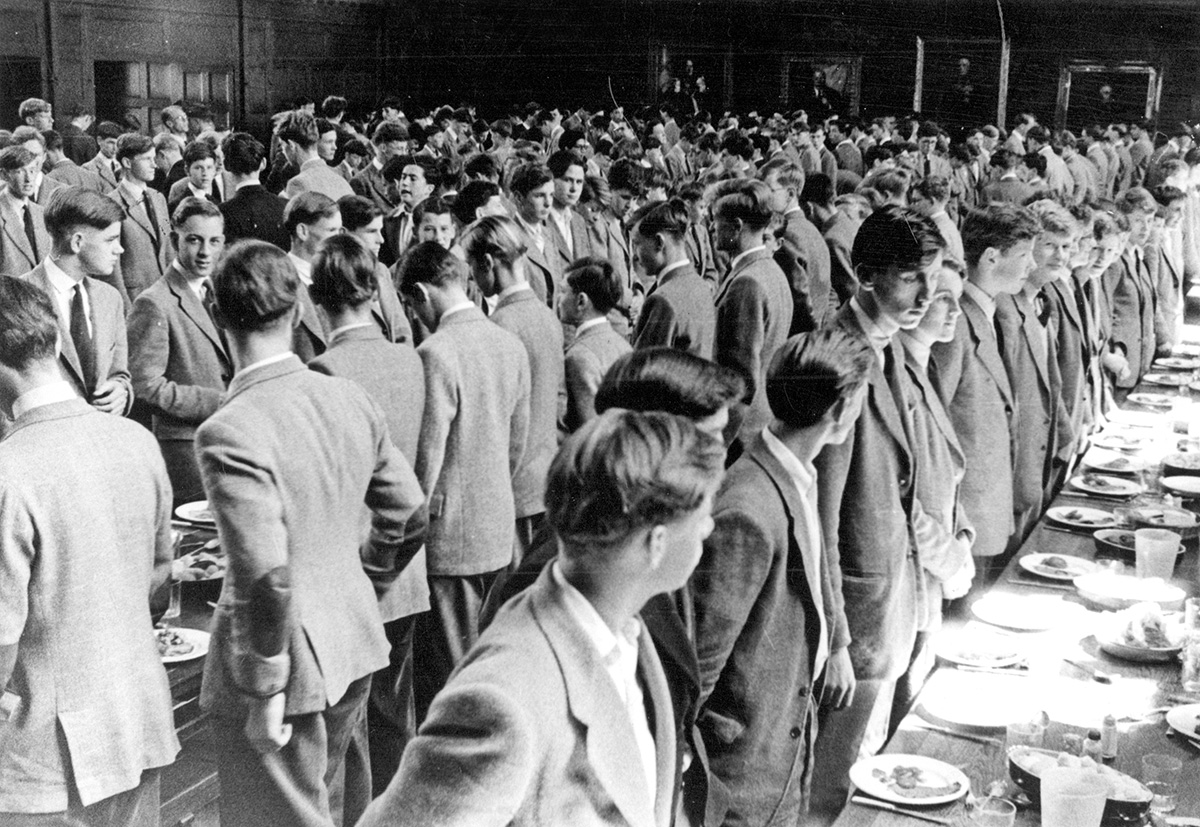
The mealtime routine
The daily routine of mealtimes changed very little for Wellingtonians throughout the 1940s and 1950s. The majority – all those who lived in the central dormitories – ate their three daily meals in the main Dining Hall, presided over by the Hall Usher, who kept order.
During the Second World War this was Monsieur Noblet, ‘a great character’, wearing his Legion d’honneur in his lapel; later, several teachers took turns for the duty. The Hall Usher, or sometimes the Chaplain, would begin the meal with a Latin grace:
‘“Benedictus Benedicat per Jesum Christum dominum nostrum,” we all crowed “ARRRRMEN” and then the chatting immediately started. I never knew what grace actually was until I looked it up recently!’ Peter Gardner (Hardinge 1946–51)
‘“MumblemumbleperJesumChristumDominumNostrum.” And we all sat down on those hard benches.’
Thomas Courtenay-Clack (Hardinge 1954–59)
‘I recall the Chaplain (the Rev Dudley Dinnis) saying grace: “We praise the Lord for this fine dish and thank the Lord it isn’t fish… benedictus benedicat!”’ Peter Rickards (Murray 1947–52)
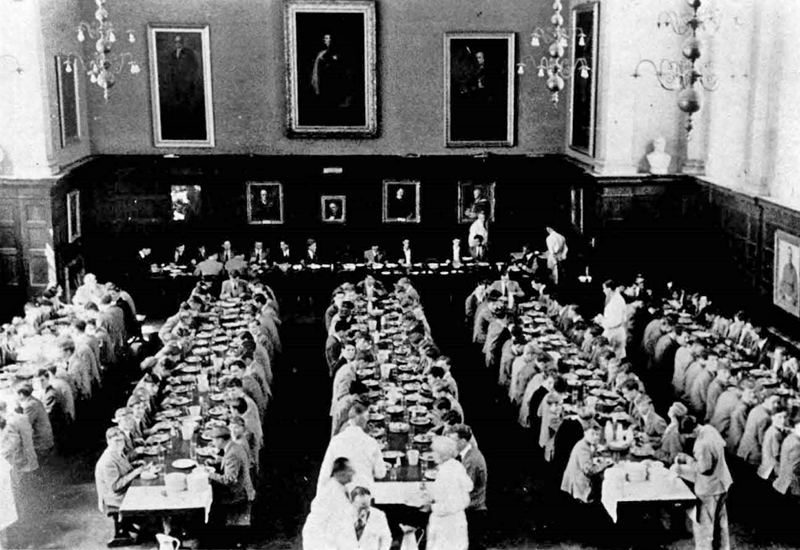
Many described the dining system in Hall, for example this OW from the early 1950s:
‘We sat at long tables, each for a dormitory, with dormitory Prefects at the head and then declining in seniority to the “squealers” at the bottom. The food was served at the foot of the table by the dormitory servant, the faithful “jally”, and the plates then passed up each side.’
Nigel Gripper (Hopetoun 1945–49) commented that ‘I don’t recall much abuse of the plates of food as they were passed up by about twelve pupils each side!’ However Peter Rickards (Murray 1947–52) recalled that ‘by this means creative additions, such as toilet tissue with the chocolate pudding, would sometimes appear on the way.’
Christopher Stephenson (Hill 1949–54) added more detail: ‘Extra vegetables were on plates in the middle of the table. If a Prefect wanted more the cry would be “potatoes up” and nobody could take any on the way!’
This system was not without disadvantages. Peter Davison (Beresford 1948–52) commented that ‘The empty plates were returned, often before the juniors at the other end had received their helping,’ while Richard May-Hill (Hopetoun 1957–61) laid out the difficulties at some length:
‘Firstly, there was insufficient space, we sat on benches with those at the foot cramped together. Secondly, those at the foot received their meals last as all the plates were passed up the length of the table, hand to hand. The results were that it was often cold, with frequently short rations and importantly there was often insufficient time to finish what was available. Those at the foot had often only just received their plate before it was cleared away and when you were on clearing duty you had to start when those at the head of the table had finished. This lack of time, and hence food, was compounded for the very junior at the foot as he had the additional duty of going to the kitchens to replenish such items as water jugs, etc or occasionally to “fetch a cloth!”’
On the other hand, Hugo White (Hardinge 1944–48) found some benefit:
Sitting at the bottom of the table had its advantage, as we were well placed to scrape and devour any morsels of food left on the plates of our seniors as they were passed down for stacking.’
‘Seconds’ were by no means frequent. ‘The elder boys did seem to be privileged to get first go at second helpings and I did feel a little guilty about this when I became ‘elder’’ John Le Mare (Stanley 1950–55)
Several remarked that mealtimes were a rush. Jerry Yeoman (Anglesey 1955–59) recalled ‘the desperate need to get to Hall before the gong and grace was said. Such a failing would incur a beating and it was no good just not attending, for your absence from your place at the dormitory table would be very obvious.’ And there was an equal urgency at the end of the meal, with Peter Gardner (Hardinge 1946–51) recalling ‘an open-ended finish only at teatime’ and John Alexander (Talbot 1954–58) commenting ‘I do remember that the meals were very brief. The regime/timetable did not allow much spare time.’
The impact of rationing
Many foods were rationed in the UK from January 1940 until July 1954. Unsurprisingly, this had a major impact on the diets of a generation of Wellingtonians. Most were accustomed to rationing before they even came to College, from their homes and prep schools, and so the limitations were nothing unusual to them.
Henry Beverley (Anglesey 1949–53) summed up the situation: ‘my generation, who were at prep school through most of the War, were under-nourished and always ravenous’, while Nikolai Tolstoy-Miloslavsky (Stanley 1949–53) commented ‘my time at Wellington was characterised (in common with the rest of the country) by dreadful food, and very little of it. When my children occasionally complained of what I regarded as their pretty luxurious fare, I would show them a photograph of my supper in the Stanley. I still have it, and it shows a plate entirely empty save for a small puddle of tinned spaghetti in the centre.’
Nevertheless, most felt that Wellington’s caterers had done their best under the circumstances. Remarkably, the number of respondents claiming that they had been ‘never hungry’ at Wellington was exactly the same as those who claimed to have been ‘always’ or ‘often’ hungry! Moreover, this did not change from the 1940s to the 1950s. Clearly hunger must, to some extent, have been subjective.
Many recalled the specific arrangements around rationing, most of which centred around butter and jam:
‘The ration of butter was two ounces a week and we had our own personal butter ration on a dish in front of us. It had to last a week and one could spread it very thinly, though hardly tasting it, or enjoy it all in a few delicious sessions! I can still estimate a two-ounce chunk of butter. This butter ration was sacrosanct, and no one tried to take anyone else’s.’ David Trafford-Roberts (Anglesey 1943–45)
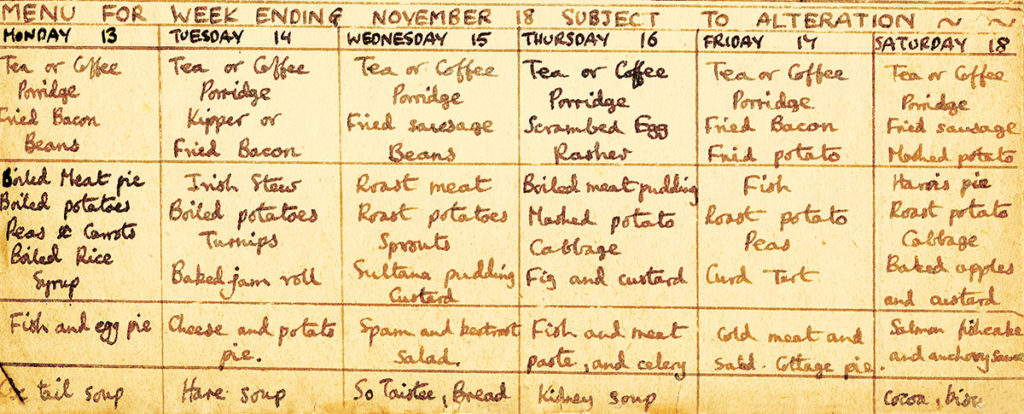
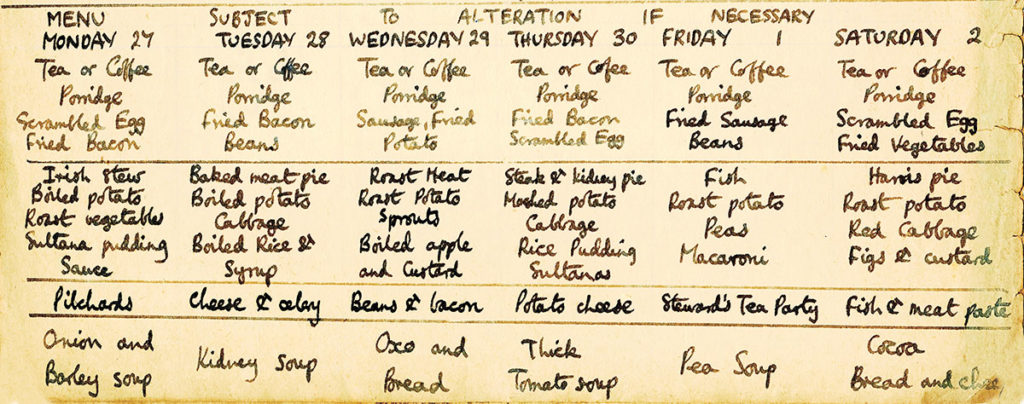
‘We had our own labelled margarine dishes and sugar jars. These were respected by all, and I do not recall any pilfering. Bread was usually white and rationed at two slices for breakfast.’ Christopher Beeton (Talbot 1943–47)
‘Butter was rationed and still scarce, and we were allowed only one small pat of it at each teatime. This being the one thing that I felt seriously deprived of during those years, I developed a keen eye for spotting an unfinished pat of it at great distance.’ Peter Gardner (Hardinge 1946–51)
‘We were given 1 lb of sugar each month and I tried to make marmalade – a disaster!’
John Beckwith (Blücher 1947–51)
‘A lot of our concern at table was centred on our own jam pots – the House cook took charge of our ration books for the basic rations, but we had control of our own “points” for things like jam, and our personal jam jars were always our own responsibility.’ Alastair Wilson (Talbot 1948–1950)
‘Butter must have been in short supply, as were marmalade, honey and jam, for one sequestered any part of a pat that was left over in the lid of one’s personal jar.’ David Nalder (Orange 1949–53)
‘We would receive a weekly ration of both butter and margarine, the latter being more generous. Those of us who were happy enough to eat margarine would sometimes exchange our smaller amount of butter for someone else’s margarine.’ Neil Munro (Talbot 1952–56)
Even when all rationing had ended, butter was still at a premium:
‘I once asked why we couldn’t have proper butter and was told that we’d been given the choice between limited butter or unlimited marge.’ William Shine (Hill 1956–60)
Everyone found their own way of coping with the shortages:
‘When parents came or relations came to take us out over the few weekends that we were allowed out, we used to go to the Wellington Hotel and stuff ourselves with good food.’ Ian Nason (Orange 1950–54)
‘I supplemented the rations by eating other boys’ sausage skins, a habit they found disgusting.’
Richard Sarson (Hardinge 1943–48)
And one incident passed into legend:
‘There was rationing but we were not really hungry like our predecessors who were said to have roasted squirrels over dormitory gas rings.’ Tim Reeder (Picton 1949–53)
‘I was part of a gang from the Hill which killed a grey squirrel with a catapult and cooked it on the brew ring and ate it, more out of bravado than hunger but it was rather delicious. It got into the Sunday papers as proof of how starving we were, but we got away with a mild ticking-off.’ Norman Tyler (Hill 1947–52)
Although the story became somewhat confused:
‘One occasion of note was when, after we had been served with a meat stew, the Sunday papers announced that the boys of Wellington College had been fed “squirrel stew” earlier in the week. As far as we were aware, no one issued a denial!’ Colin Mackinnon (Hardinge 1951–56)
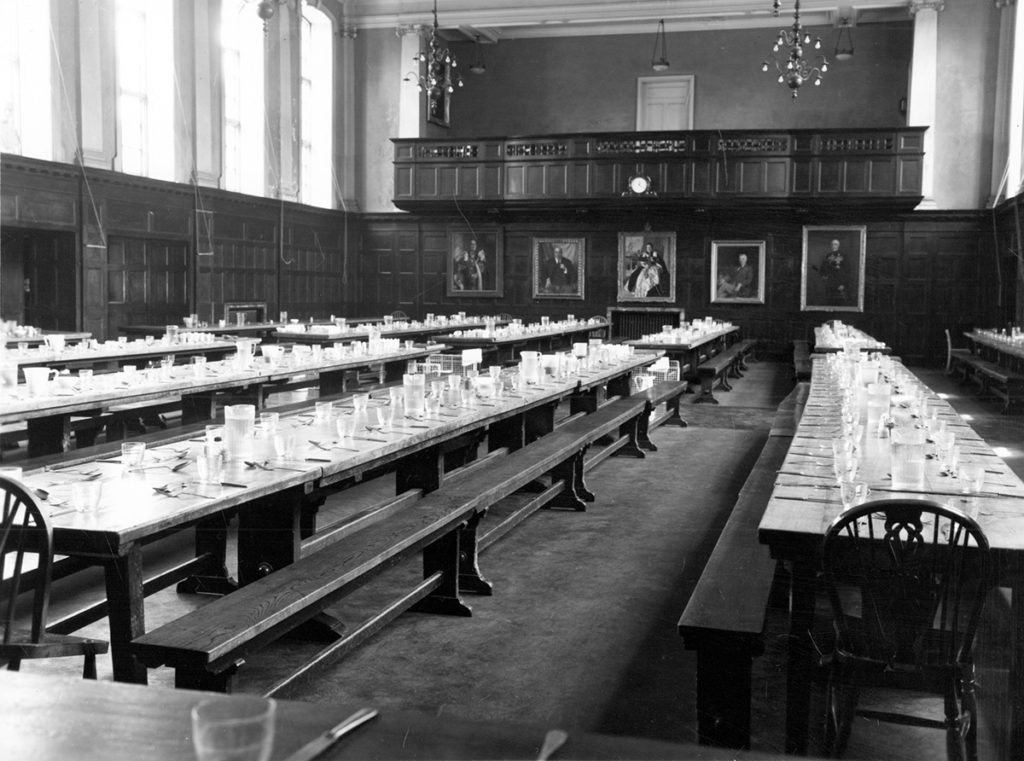
Good food or bad?
A minority of our respondents were disparaging about the fare served to them at Wellington, describing it as ‘rather poor’, ‘awful’, or even ‘a disaster’! However, most felt that it had been ‘adequate’ or even ‘pretty good’, although somewhat stodgy and lacking in variety.
The good …
‘My favourite meal was baked beans, bacon and fried bread. Oh they did cook the fried bread so well.’ John Alexander (Talbot 1954–58)
‘The food served in the main Dining Hall was healthy and varied, though perhaps with less meat than in these days.’ Peter Rickards (Murray 1947–52)
‘Given that certain foods were still restricted, the food we received in House was surprisingly good. I even recall enjoying a piece of whale steak.’ John Watson (Benson 1946–51)
‘I thought the food was good, even the de-hydrated powdered egg and potatoes! The high point of the week was fish on Friday, the smell of which, wafting through the colonnades, was for me a comforting experience, marking the week drawing to a close.’ Michael Mathew (Murray 1956–60)
The bad …
‘“Frogspawn” comes to mind and steamed date pudding – ugh!’ Anonymous
‘For the Sunday evening meal, it was usually cold pilchards in tomato sauce – yuk!’ Anonymous
‘I was personally not keen on “fish eyes” (tapioca) or whale meat, both of which appeared rather frequently!’ Christopher Beeton (Talbot 1943–47)
‘At breakfast, coffee and tea were provided but both tasted the same, one could only tell by the shape of the pots.’ John Hoblyn (Hardinge 1945–50)
‘One incident did cause some amusement. The kitchen decided to serve mutton (whether roast, casseroled or stewed I don’t recall) anyway hardly any of it was eaten, which induced the Master, Harry House, in his wisdom, to address us on the subject of mutton!! It was good for us, he said; health giving, he said – and delicious as well! (Maybe he had the one edible portion!!!!)’ Jeremy Watkins (Blücher 1951–55)
‘At breakfast, coffee and tea were provided but both tasted the same, one could only tell by the shape of the pots.’ John Hoblyn (Hardinge 1945–50)
‘One incident did cause some amusement. The kitchen decided to serve mutton (whether roast, casseroled or stewed I don’t recall) anyway hardly any of it was eaten, which induced the Master, Harry House, in his wisdom, to address us on the subject of mutton!! It was good for us, he said; health giving, he said – and delicious as well! (Maybe he had the one edible portion!!!!)’ Jeremy Watkins (Blücher 1951–55)
‘Food was pretty awful. Bread-and-butter pudding looked like an over-baked raft floating on a sea of milk.’ Michael Southwell (Orange 1955–60)
‘We once found a dead mouse in our gravy jug.’
Richard Godfrey-Faussett (Anglesey 1946–50)
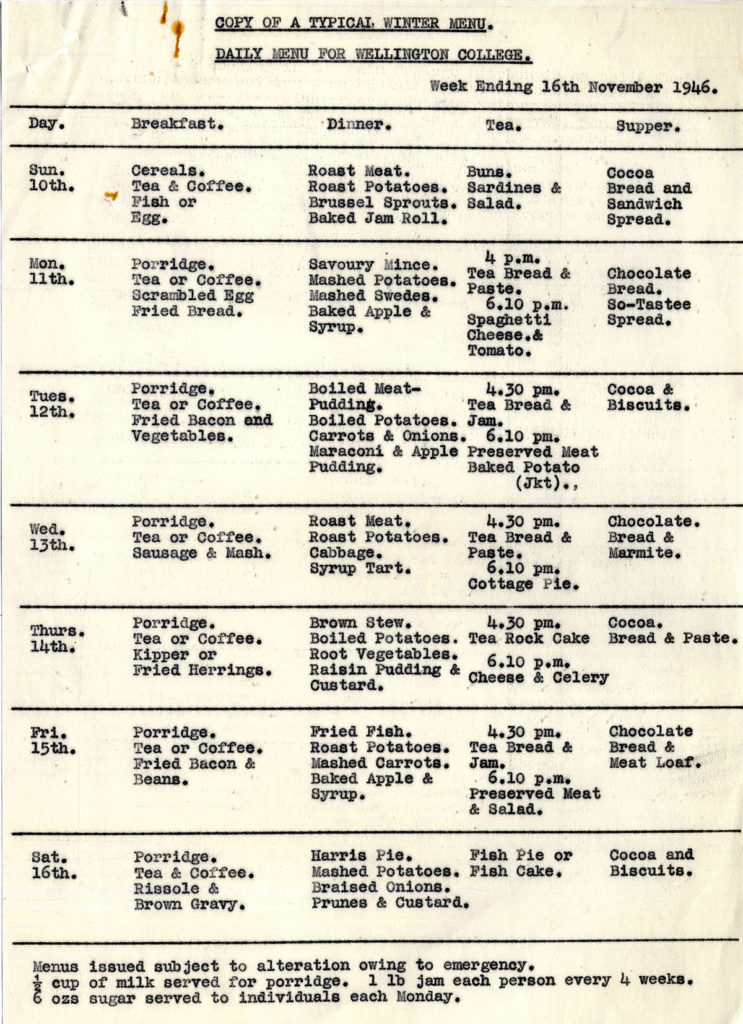
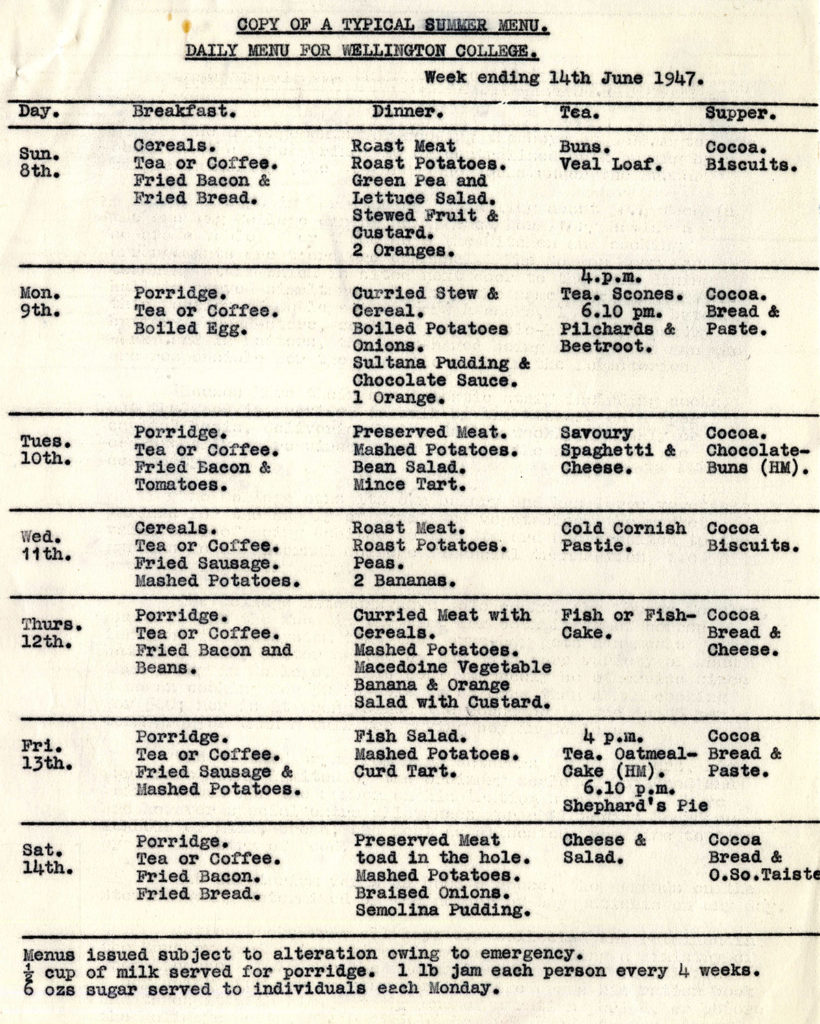
And the ambivalent:
‘The diet relied heavily on stodgy puddings (spotted dick – very filling) and on potatoes, mostly grown on the College farm in the land towards Little Sandhurst.’ Alan Munro (Talbot 1948–53)
‘Food was basic. The menu board at the entrance to the Dining Hall looked impressive but we soon learned that the varied puddings advertised – raisin pudding, currant pudding, date pudding and College pudding were all the same suet duff.’ Pat Stacpoole (Combermere 1944–48)
‘I remember being fed frequent helpings of baked beans, which gave me an aversion to them for life. Bread-and-butter pudding and tapioca were other hates. On the other hand I was very fond of spotted dog.’ Allen Molesworth (Blücher 1945–48)
‘The food was not bad, and every dish had a rather vulgar name. “Brian’s Balls” were what we called the meat balls, named after one of our Prefects. I think we called the pudding “Spotted Dick”, but it could have been “Dead Man’s Leg”.’ Martin Kinna (Murray 1953–58)
‘Really the school food wasn’t all that bad once you got used to pilchards, Goya baked beans and “dinosaur dumps.” I named them that: I really did! And I was tickled to hear that the name stuck.’ Thomas Courtenay-Clack (Hardinge 1954–59)
And in the end, as Christopher Napper (Lynedoch 1955–60) philosophically remarked, ‘School food perhaps makes one less picky in later life.’
Table manners
Overwhelmingly, manners at table seem to have been good, or at least acceptable. John Alexander (Talbot 1954–58) reminded us that ‘in those days discipline was strong both at home, in school and out in society.’
Several respondents pointed out that ‘Any bad behaviour by the ‘squealers’ at the foot of the table would be seen by the Prefect at the top and duly punished,’ and that on occasion the Master himself would eat in Hall. Peter Davison (Beresford 1948–52) simply said ‘The manners were good as everyone concentrated on getting some food.’
Nevertheless, boys did try to vary the routine, and one particular method seems to have been a favourite, mentioned by many.
‘I did hear of a story of how some students at another table used their table knives to flick the pats of butter onto the very high ceiling of the Hall. There, it stuck before melting and dropping onto some unsuspecting student. I find it hard to believe that the Prefects sitting at the head of the table wouldn’t have seen this happening and put a stop to it. But if true (which I doubt), this must have been interesting to watch.’ Chris Heath (Beresford 1948–53)
But according to Peter Gardner (Hardinge 1946–51), the Prefects themselves were responsible for the trick! ‘One evening one of the Prefects invented a “good” game: we would put a pat of butter on a folded handkerchief held at two opposite sides, bring the hands together so that the butter was drooping low in the handkerchief, and then pull the hands apart as sharply as possible, thus propelling the contents fast into the air. The objective was to try to make it reach the high-vaulted ceiling and stick there. I cannot recall whether the avowed objective was ever accomplished, and the inevitable splodge of failure avoided, but the fun of this game seemed fully to justify the sacrifice of a precious pat of butter.’
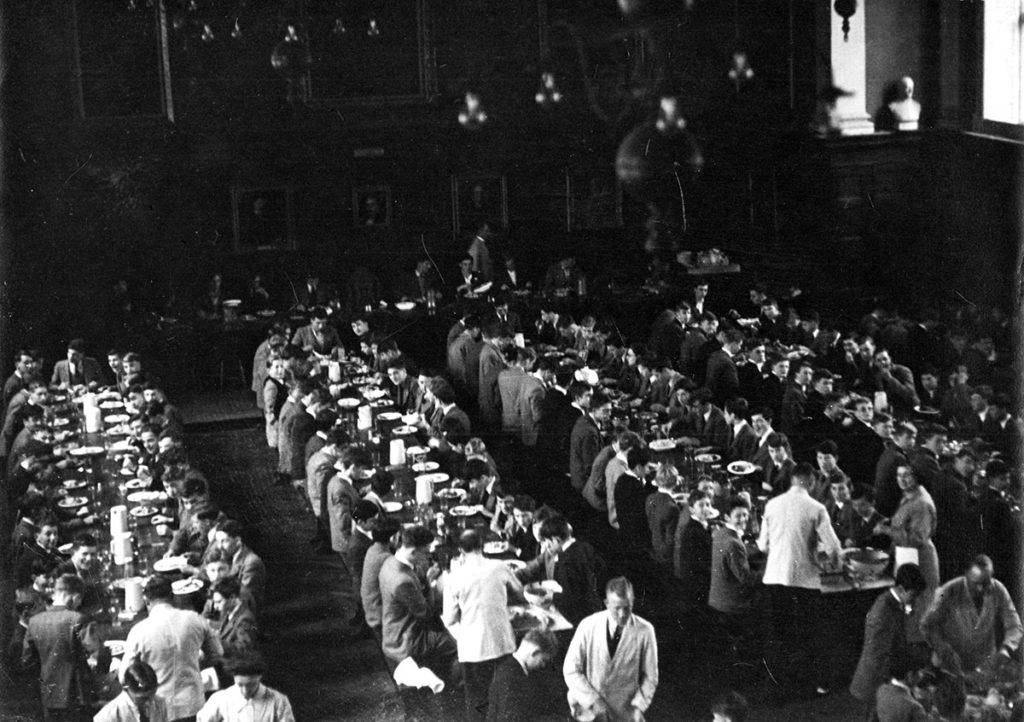
Others were more inventive:
‘We were relatively well-behaved. Our entertainment was provided by the Murray alongside us; they were totally out of control. A highlight was the day that one of their number infiltrated the Hall to drop a few grains of potassium permanganate into the bottom of the Master’s empty water glass. To the rapturous delight of the boys, when the top table “jally” filled it with water it turned mauve!’ Henry Beverley (Anglesey 1949–53)
‘One teatime, one young gentleman brought with him a live piglet which he had won that afternoon through his bowling prowess at the local fete, which then escaped accidentally/on purpose.’
William Field (Lynedoch 1952–56)
A couple of respondents recalled that the youngest boys, those in holding Houses, such as Upcott, would eat at tables in the side aisle of the main Dining Hall. Richard May-Hill (Hopetoun 1957–61) described this as ‘very civilised and comfortable.’ By contrast, Hugo White (Hardinge 1944–48) wrote that ‘Our manners, tucked away out of sight, were barbaric. Arguments became physical and often ended in pepper being sprayed over one’s adversary.’
Occasionally, high spirits became something more unpleasant. John De Grey (Blücher 1938–43) wrote that ‘The boy sitting immediately above me was a lout and continually stuck his fork in my bottom’; according to John Beckwith (Blücher 1947–51), this habit was known as ‘stoking.’ Thomas Courtenay-Clack (Hardinge 1954–59) told the following story of how bad behaviour eventually met its comeuppance: ‘There was a little new boy at the very end of the long dining table who was harassed throughout his first term by the bully who sat next to him. His elbow would be nudged as he sipped his tea, spilling it down his front, as he bit into his toast, it would be pushed up into his nose, leaving marmalade on his face. The little boy endured it quietly all term until the last day when his tea spilled down his shirt one last time. The little boy rose calmly, seized his jar of marmalade and brought it down hard on his tormentor’s head. The bully sank silently to the floor; blood, marmalade and glass sliding down over his ears. Out cold! Nothing happened to the little boy.’
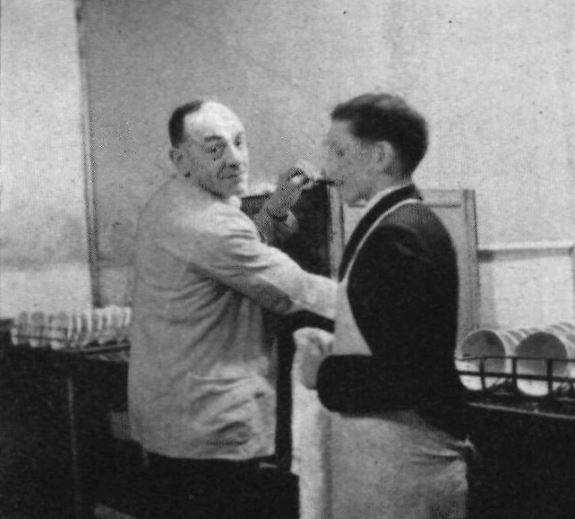
Meals in the Houses
The boys in out-of-College Houses, Talbot, Benson and Stanley, plus the slightly ‘in-between’ Picton which was classed as a Dormitory, ate all their meals in their own building. The format was very similar to that in the main Dining Hall, with boys sitting in age order and House Prefects at a separate table to keep order. However, the students would often be joined for meals by the House Tutor and his wife.
Until the early 1950s the meals were cooked in each House’s own kitchen, and at that point were certainly reputed to be better than those in Hall, but later: ‘food came down from the main kitchen in College – ‘muck on a truck’, it was known as – reheated and served by our own kitchen staff’ John Green (Talbot 1954–58). Douglas Miller (Benson 1951–56) enlarged on this theme: ‘Being in a House, we supposedly had better food. I have very little memory of what we ate, but I believe it was slightly better in a House. When Potter succeeded MacDermott in the Benson we switched to central catering with the meals coming down in a van. This led some of us to enquire what exactly the benefits of being in a House might be.’
Some were more specific about the disadvantages:
‘Picton, of course, being separated from the main building, had all its meals delivered in special containers but they certainly lost a lot of heat in the process.’ Anonymous
‘The food brought from the central College kitchens tended to be overcooked and lukewarm.’ Anthony Goodenough (Stanley 1954–59)
‘In the Benson we ate all of our meals in the House in those days, including lunch, which meant a great deal of walking to and from the main buildings.’ Anthony Bruce (Benson 1951–56)
The Dining Hall staff
Each table in Hall was waited on by the dormitory’s ‘jally’, whose other duties included cleaning the dormitory during the day, collecting laundry and so on. Several respondents mentioned their particular ‘jally,’ his peculiarities and how he was regarded by the boys:
‘These gentlemen were always immaculately dressed like maître d’s. They were highly respected and kept us intrigued with their stories of what real life outside school was all about.’ Peter Rickards (Murray 1947–52)
‘We had a superb “jally”, Jock. He took immense pride in serving us and was always first through the serving door carrying the tray.’ Martin Kinna (Murray 1953–58)
‘Our dormitory servant was adept at getting us second helpings if needed.’ Randal Stewart (Anglesey 1953–56)
‘Hopetoun’s “jally”, Jack, was prone to fainting, and once collapsed just after he had brought in lunch (toad-in-the-hole I think), upsetting the tray of food with a great crash and scattering the contents all over the place. While he was carried out one of the other jallies rapidly gathered it all up, put it back on the tray and proceeded to dish it up. I think everyone ate it without worrying too much about whether it had been on the floor or wherever!’ Charles Ward (Hopetoun 1951–55)
‘They worked hard and were treated with undeserved disdain. Ours was known as “Creeping Jesus”.’
Hugo White (Hardinge 1944–48)
‘Feeding about 700 people all at the same time was a tall order. Arthur was our “jally” and I think we never fully appreciated what he did for us.’ Jerry Yeoman (Anglesey 1955–59)
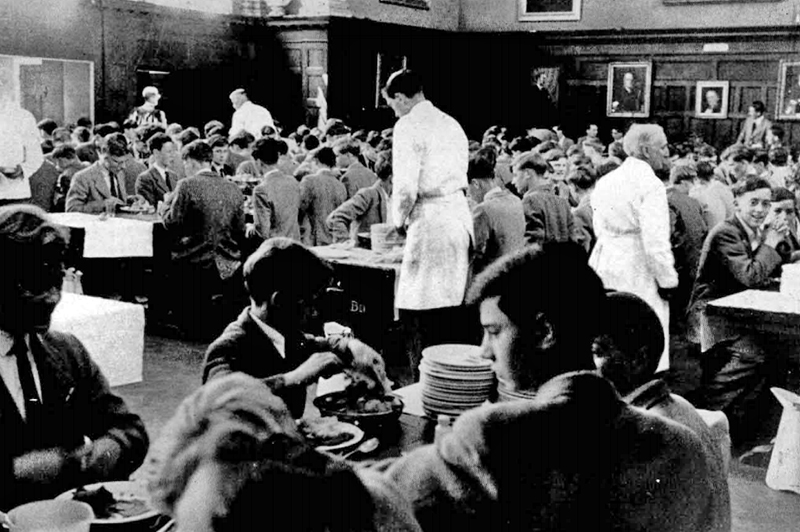
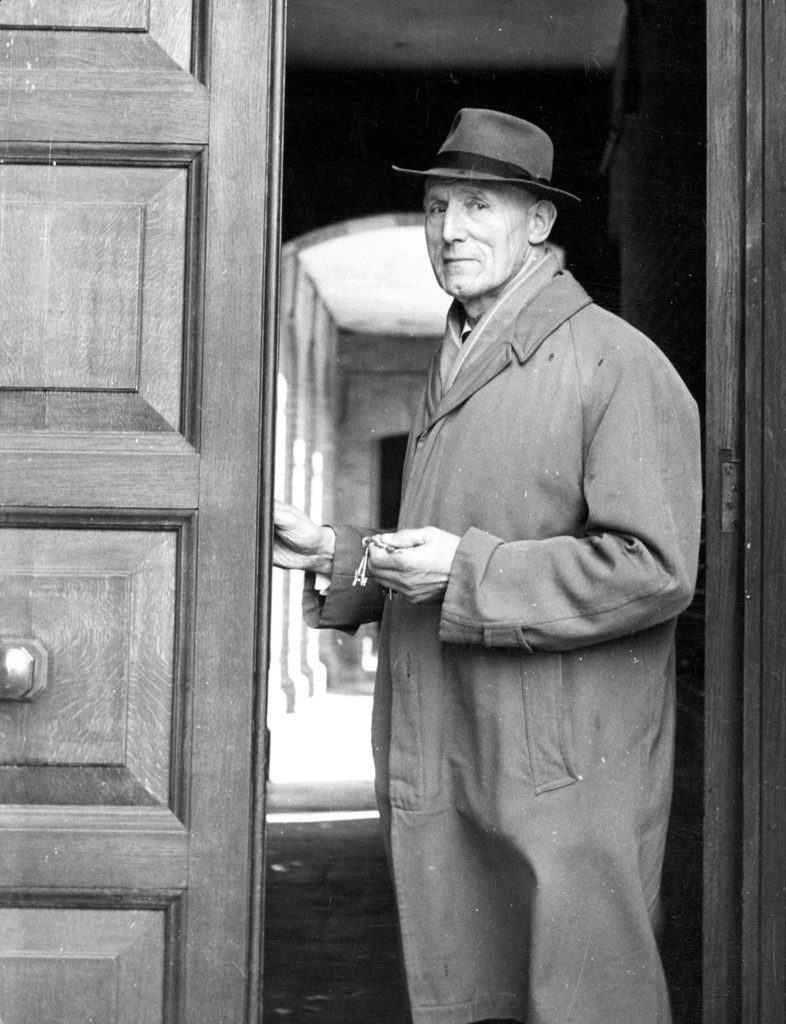
‘Our “jally” was Taffy Herridge, a tall, gaunt veteran of the First World War and many years’ service in India. He had sharp elbows and bested the other jallies in securing a greater share for us. He was a fountain of “other rank” smut, which we all relished. His favourites were rewarded with little extras. That helped!’ Henry Beverley (Anglesey 1949–53)
Another highly memorable character was the Steward, Captain Aston, who held the post from 1943 to 1951:
‘The wizard in my time was a Captain Aston, a man of impressive height and girth. He would come into the Hall from to time and stand by the kitchen entrance watching the ‘jallies’ serve the tables.’ Chris Heath (Beresford 1948–53)
‘I have no doubt that the Steward, Captain Aston, a late Quartermaster of the Grenadier Guards, worked wonders with the meagre rations available … we held this great 22-stone soldier with great affection; when he appeared in Hall after our Christmas meal he received prolonged cheering, stamping of feet and beating on the tables.’ Hugo White (Hardinge 1944–48)
‘I do remember one occasion, however, when the Steward was booed in Hall, and he was reduced to tears. He had joined the staff from the Army, having been rescued from Dunkirk and then fought with the Grenadier Guards until he was retired by age, and he came to College determined to give us the best food possible. It was a very difficult job, and did not deserve the booing, which was from one dormitory, and I am glad to say that no one else joined in, and it was generally disapproved of. He was a splendid chap, about 6ft 6in, and vast in size.’ David Simonds (Orange 1941–46)
‘The College Steward was a Falstaffian character who presided over the Dining Hall. He was an ex-Guards Quartermaster, and used to ask the completely rhetorical question ‘Any complaints?’ He said the boys would have bananas as soon as he could get some straight ones.’ Peter Bell (Blücher 1943–48)
‘I had an arrangement with Captain Aston (6ft 5in and 20 stone), whereby I traded in sweet coupons in return for trays of cakes for my friends in Beresford. Captain Aston had a formidable reputation in the Army and was a brilliant pistol shot.’ Peter Davison (Beresford 1948–52)
And one respondent remembered the chef:
‘The Head Chef, named Mr Shepherd, was an enormous man, who must have weighed in at well over 20 stone, and we inevitably grumbled that he was eating most of the food. Among the many recurring dishes he cooked for us was Shepherd’s Pie. The discovery one day of a pubic hair in one boy’s portion resulted in the dish being known from then on as “Shepherd’s Bush”.’ Peter Gardner (Hardinge 1946–51)
Perhaps the staff were slightly more appreciated by those boys at College during the War, who had to do the washing-up, a chore which their successors were spared:
‘The washing-up after each meal was part of the experience of the junior boys. “Jallying”, as we called it, was done on a rota. At the conclusion of a meal, the half-dozen boys whose names appeared on this rota repaired to the nether regions to wash some four hundred plates, glasses, and sets of cutlery. The plates were stacked in wooden racks and lowered into vast sinks where a turbulence of the hot water rendered them more or less clean; the final dousing was into a sink of boiling water from which they emerged hot enough to dry on their own. The cutlery, for some reason, was not given this treatment and was tipped out from metal baskets onto a large table, covered in sacking, to be hand dried. The sacking was wet, impregnated with noxious grease, and smelled horrible. In spite of these less-than-hygienic practices, we never seemed to suffer any ill effect.’ Hugo White (Hardinge 1944–48)
‘The boys did the washing-up in wartime. The washing machines were inefficient and stank. Shift work on a daily basis, so not very often, but sobering.’ John De Grey (Blücher 1938–43)
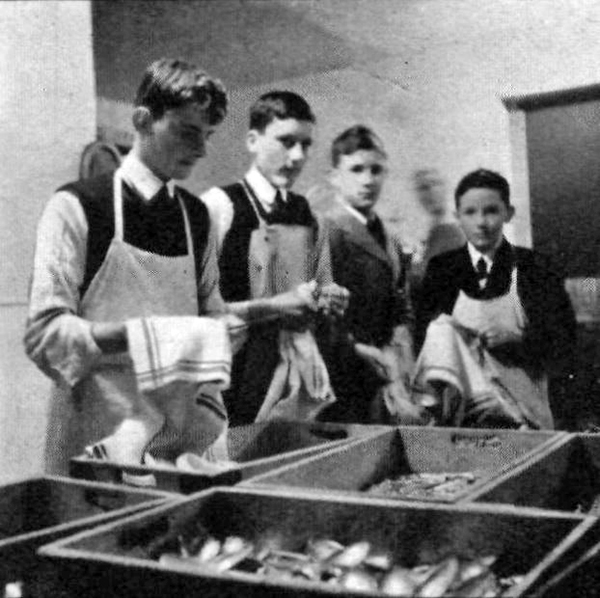
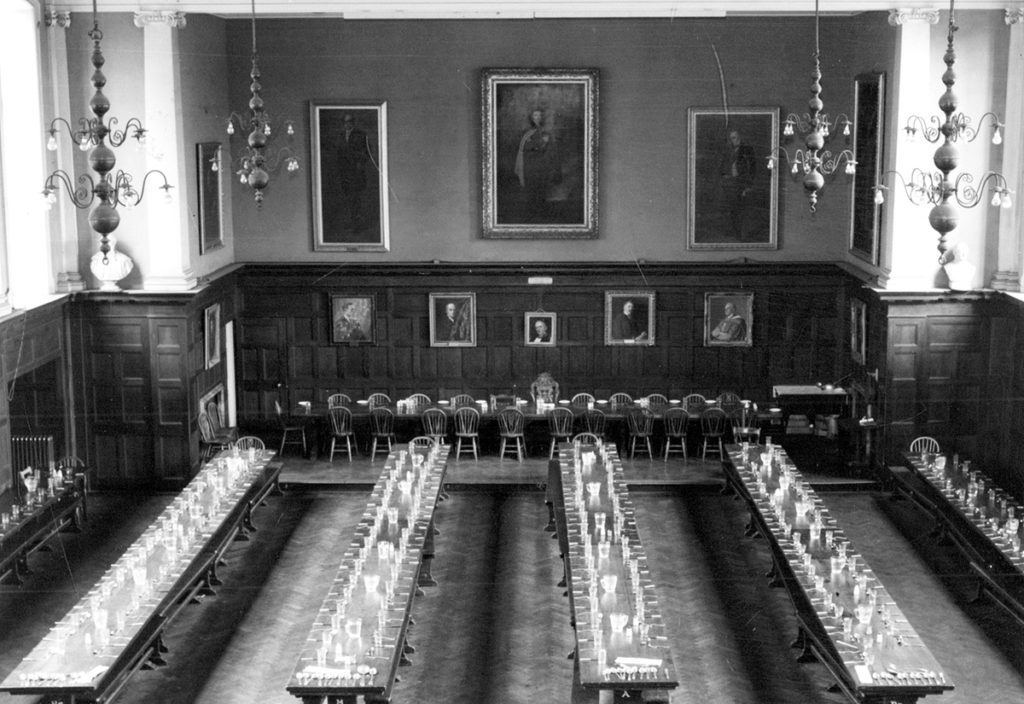
High Table
Finally, those who made it to the heights of College Prefect recalled the unusual ‘perks’ which this brought:
‘Members of the “Upper Ten” were privileged to sit at the head table. This meant we could partake of “Col. Pre. swipes”, a glass of ale with the evening meal.’ Peter Rickards (Murray 1947–52)
‘Food improved when, as a school Prefect, I had an edible supper each evening, with a bottle of beer!’ Christopher Birt (Beresford 1955–60)
‘The little privileges as a College Prefect, such as supper on our own in Dining Hall with a complimentary bottle of brown ale, were exquisite delights.’ Ross Mallock (Murray 1954–59)
‘On the very last night of the Summer Term of 1956, when most of the College Prefects were present, after supper we all climbed up onto the high table and danced an impromptu “can-can”. There is a photograph of this, which some of us still have!’ Anthony Bruce (Benson 1951–56)